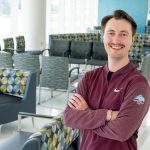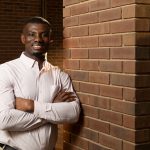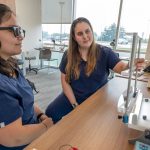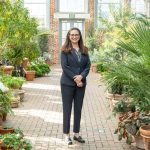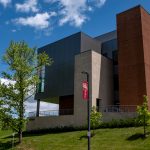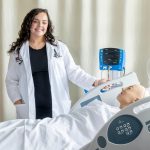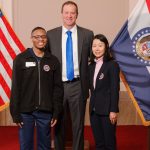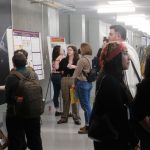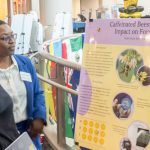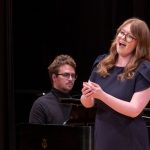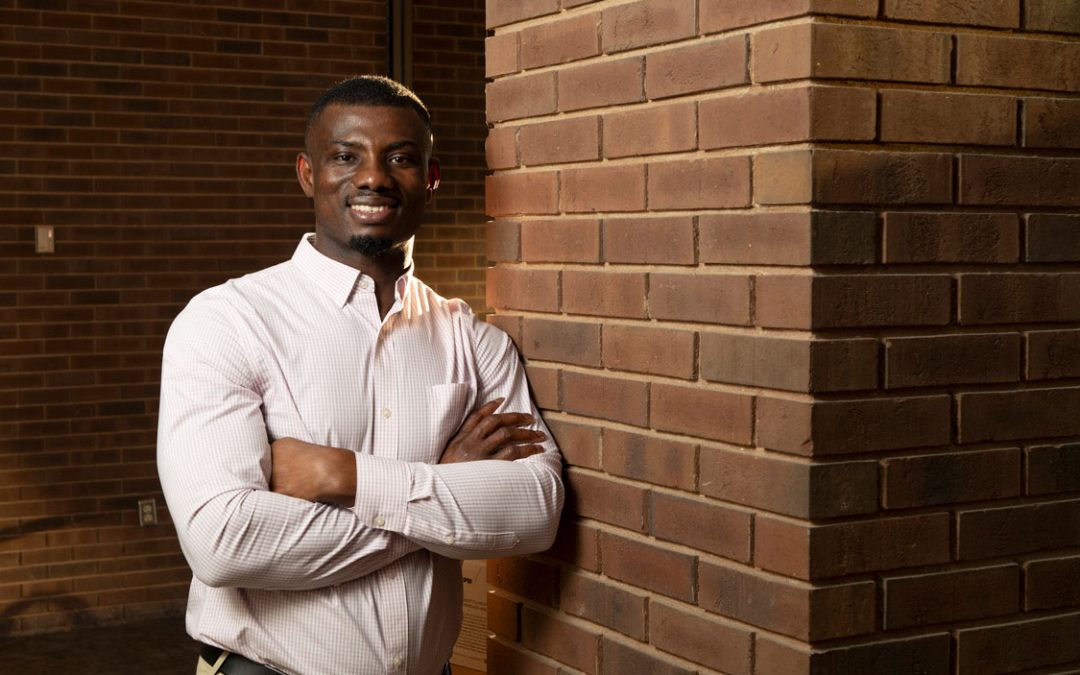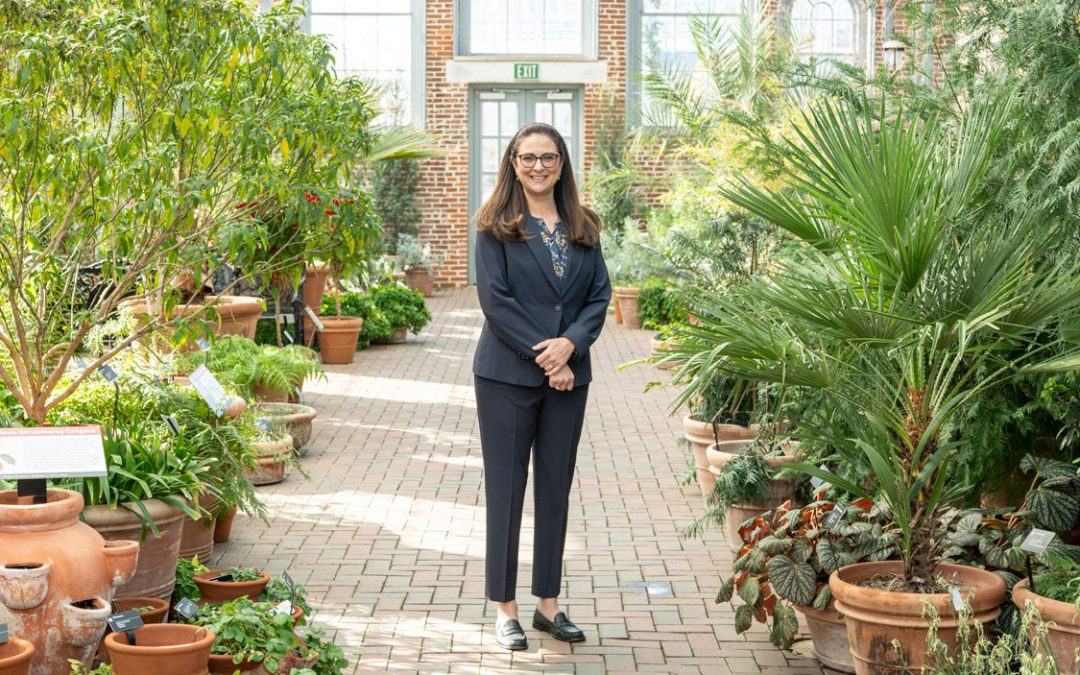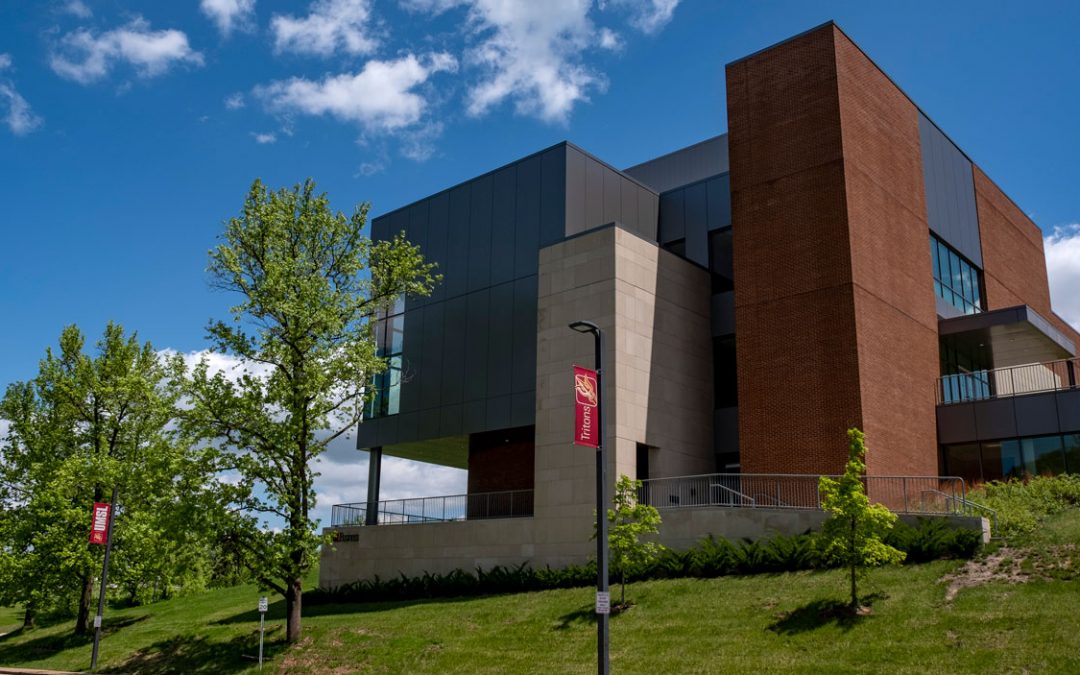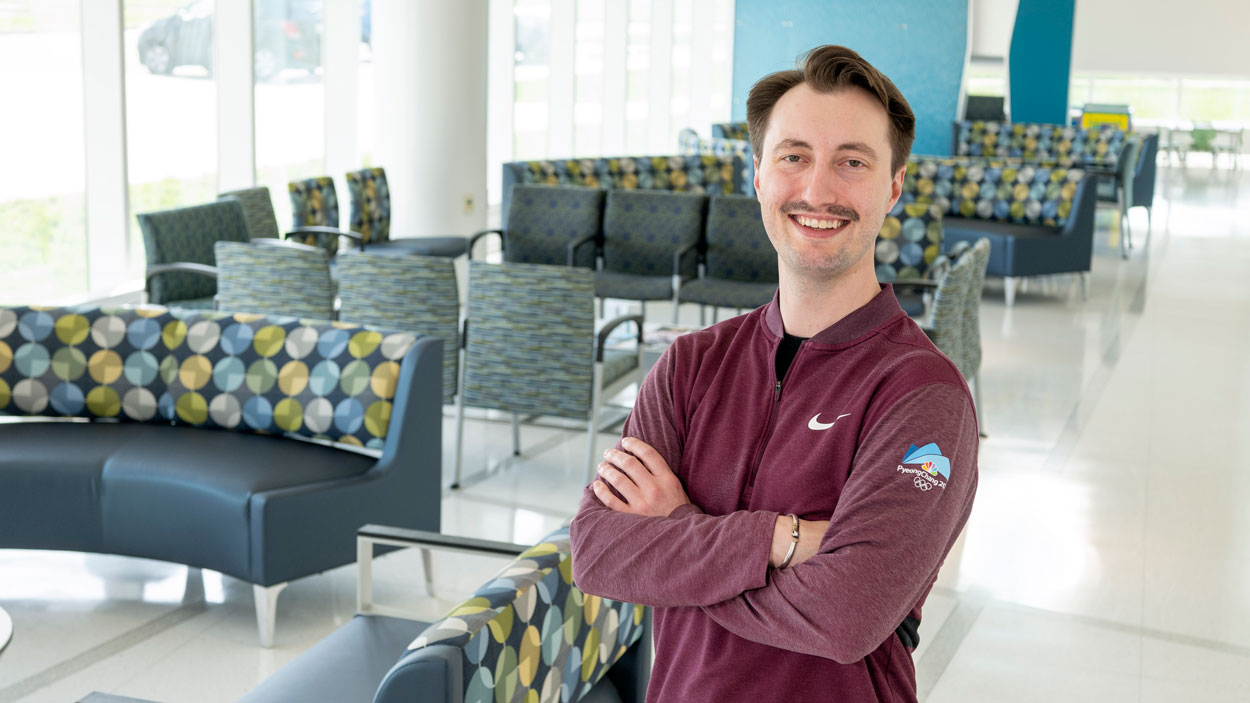
Alex Fenson, who will graduate from the College of Optometry this month, found his passion for vision therapy while at UMSL. (Photo by Derik Holtmann)
When it came time to apply to optometry schools, Alex Fenson wasn’t sure where his path would take him. The Bemidji, Minnesota, native wound up applying to six different schools, but his interview day with the College of Optometry at the University of Missouri–St. Louis was, by far, the best. He got to talk with faculty members in the college as well as a first-year student, and the environment seemed incredibly welcoming. He liked the small class sizes, which gave students more opportunities to connect one-on-one with both fellow classmates and professors, and quickly decided to enroll at UMSL.
That close-knit environment became a hallmark of Fenson’s experience at UMSL over the past few years, and it helped make the transition from undergrad much smoother than he expected.
“I feel like I got super lucky with my class as a whole, because during first year, we really bonded completely,” Fenson said. “We all helped each other when we struggled with certain things, and so that was really nice. And it was very true that the professors are very willing to help and willing to answer questions.”
Fenson, who will graduate from the College of Optometry later this month, started his optometry education while also balancing the demands of competitive curling – a sport he began playing at age 7. The son of curler Pete Fenson, an Olympic bronze medalist and seven-time national champion, Fenson competed in the Olympic trials for curling during his first year of optometry school.
While he took a break from the sport to focus on his optometry career, he’s still close with his old teammates on Team Dropkin, who competed in the 2025 World Men’s Curling Championship in Saskatchewan, Canada, in April. His brother’s fiancé also recently competed in the Olympic trials near Denver, and Fenson was able to attend while completing one of his optometry rotations at a private practice in Frisco, Colorado. Working at a small private practice was an eye-opening experience for Fenson; the practice was run by just a single optometrist who saw all the patients himself and also oversaw all the business operations such as billing and equipment.
Fenson’s first rotation was at the College of Optometry, which allowed him to ease himself into seeing more and more patients every day. Next, he worked at the Family Care Health Center in St. Louis’ Carondelet neighborhood, which gave him even more freedom to run exams under the supervision of preceptors. “We kind of got the keys to drive the car,” he said.
Working at the Robert J. Dole VA Medical Center in Wichita, Kansas, was one of his favorite rotations; he loved working with the veterans, hearing their stories and being able to give back to people who fought for the country. And he’s currently wrapping up his final rotation at Pepose Vision Institute, which has given him the opportunity to work side-by-side with ophthalmologists for the first time.
Fenson feels his diverse rotation experiences helped to deepen his understanding of several different modalities of practice.
“I feel like that’s so great for us because even if we have an idea of what we want to do, it’s nice to actually get hands-on experience so you can actually see if you enjoy it,” he said. “Working in vision therapy at school was really when my eyes got opened up to it, because I did not know that I would like that specialty.”
Fenson found his passion working in vision therapy, particularly with the pediatric population, which he said ties in well with his undergraduate degree in exercise science. He enjoys being able to help patients who struggle with focusing or using their eyes altogether and having the ability to see the same patients week after week to follow their progress and develop a personal bond with them.
“I like the fact that we actually get to connect with our patients,” he said. “We get to sit down and learn a little bit about them, what they do on a daily basis, and what their functional needs are. With that, you just naturally become a little closer with your patients, which I really enjoy. With vision therapy, you get to see how what we’re doing with them is actually helping their vision and helping their eyes function together. I could see the kids improving with their vision and that things were getting easier for them – they were able to see the board better or be able to do their homework better. That’s probably the most rewarding for me so far.”
With that in mind, after graduation, Fenson plans to move back to his hometown of Bemidji to bring vision therapy to the area through his work at White Spruce Optometry. “Right now, there isn’t vision therapy in the area – the closest one is two and a half hours away,” he said. “It seems like a really good opportunity for me to bring something to the community that they really needed.”
He feels his education in the College of Optometry and hands-on clinical experience across a range of different rotations have prepared him well as he prepares to launch his optometry career.
“I’m just really excited to use the knowledge that we learned here at school and all the skills that we learned and actually be able to bring it back to my hometown community,” Fenson said. “There’s not a ton of optometrists in my hometown, so it’s really nice to be able to provide a service that’s needed. Going back home is also awesome; I’ve always hoped I could end up at home and just got lucky enough that I was able to find a job back in my hometown.”
And while he acknowledges that optometry school can be demanding, Fenson cautions future students not to get too overwhelmed or intimidated as they’re starting out.
“The first year does seem like a lot, but as long as you put forth the effort, it’s not that bad,” he said. “The professors are there to help you, your classmates are there to help you, and it really is just a skill set that needs to be built over time. The more you do it, the better it feels. Focus on the big picture and don’t get overwhelmed right away.”


